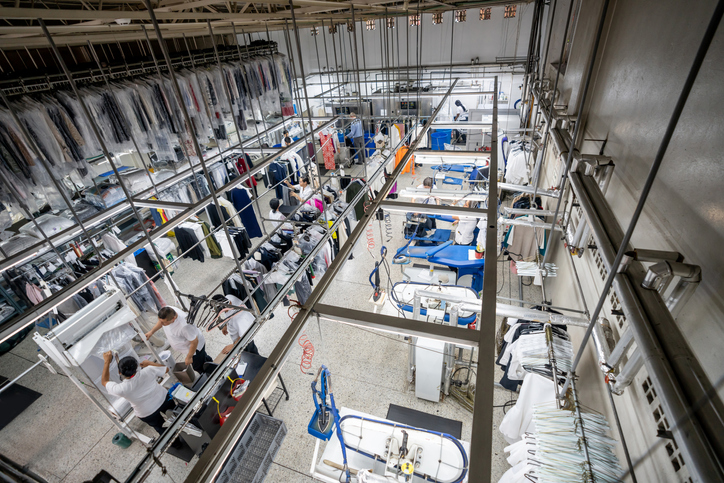This is an excerpt from On the Line, labor organizer Daisy Pitkin’s account of UNITE’s bold, five-year campaign to bring a union to the dangerous industrial laundry factories of Phoenix, Arizona. The fight is led by two courageous women: Daisy and Alma, a second-shift immigrant worker who risks her livelihood fighting for safer working conditions.
Two days before the labor board’s secret-ballot election, a rumor spread through the plant that the company had installed hidden cameras in the lunchroom so they could see who voted for the union. And by some extraordinary “coincidence,” as La Sandra later called it in court, the rumor was timed perfectly with the actual removal of old surveillance cameras from the lunchroom, where the voting would occur, and the drilling of small holes in the ceiling, where apparently the company planned to install new cameras at some future time.
This had an effect. Some of the quieter supporters were suddenly not opening their doors to us, though we knew that someone was at home. We could hear the TV or radio switch off. We could see the blinds shift as someone peeked through the window. One of your coworkers, Julia, who had signed a card during the blitz, finally came to the door on our third or fourth try. Her hands shook as she said, over and over, I’m sorry, I’m sorry, I’m sorry.
When this happened, you would turn quickly away from the door, a forced nonchalance barely masking your agitation as we returned to the car. What are they so afraid of? you would say, seething. Are they afraid things will get worse? And: How could things get any worse—people are burned and stuck with needles, and their arms are crushed? And: Are they worried the company will stop giving us their seven-cent raises? And: Why do they believe anything the company says? And: How are they not more angry? And: How are they not more angry. And: How are they not more angry?
I did not have any answers, and I think you took my wordlessness—my awkward “I know, I know”—for dispassion.
Why do you even do this work? you demanded to know in the car after yet another of your coworkers hid behind her door. Why do this, you said, instead of some other job you could have gotten? You didn’t say “you, a white person, you, a person who went to college.” You didn’t say “you, a person who has nothing to lose in this fight, who is, in fact, being paid to organize the fight, instead of hoping to hang on to her job despite the fight, or hoping to get her job back after it is won.” But I understood. You were pointing directly to a sort of slipperiness, or a fissure, that had gone unaddressed, one that perhaps had been brought into sharper view by the anguish of losing ground as we were, but one that I am guessing you’d had in mind since the first time I sat on the olive couch in your living room.
I said something about the fact that organizing workers is the only way to make real change in a world controlled by rich people who already have too much and still want more, and that’s why I was doing it. And this is the truth, of course, or it is a truth. But we both knew it was not an answer to what you were asking.
Another truth is that I had not spent enough time thinking about the fissure between staff organizers and the workers we help organize, or the disparity at its heart. Most staff organizers, like me, came in from outside the union rank and file—which was okay, most people seemed to believe, because we were skilled, or becoming skilled, in fighting highly organized corporations, which is a very hard job. We justified our presence in the union as a necessary intervention, required by the professional skill set we provided. And it was not my job to think about the structure of the union, to wonder about its fairness, or what shape it might give to power, or its ability or not to precipitate internal democracy. My job was to organize your coworkers and win. My job was to organize you.
I had also not thought about the disparity between our roles in the fight because the pace of campaigning allowed little room for anything outside the daily, hourly, minute-by-minute work of moving people toward the union in order to win. In fact, I had only noticed the disparity at all when I grappled with the slippery language organizers use to describe campaigning, the way pronouns shifted depending on the presence or not of workers. I learned early on to say that it was your fight, your union, that we were there to help guide you, to fight alongside you. But in the late-night debriefs or at the motel bar afterward, the we staff organizers used referred to us alone, and the prepositions in our speech did a lot of heavy lifting. We were going to grow the union through organizing. We were going to build power for workers. We were going to win the campaign against the company, or we were going to lose it.
I want you to know that I was not dispassionate during these weeks. I was not unaffected. We were losing ground, in real time, and our failure to win would have consequences: Your coworkers, and you—if we were able to win your job back—would continue to work unprotected from the grievous dangers of the factory. It would be even more difficult to win at other laundries in Phoenix after losing at yours. The union would likely scale back on resources for red-state organizing if the campaigns seemed unwinnable, and tens of thousands of laundry workers around the country would remain unorganized.
From ON THE LINE: A Story of Class, Solidarity, and Two Women’s Epic Fight to Build a Union by Daisy Pitkin. Reprinted by permission of Algonquin Books of Chapel Hill. Copyright © 2022 by Daisy Pitkin. All rights reserved.

